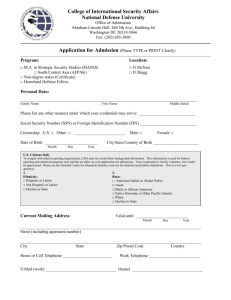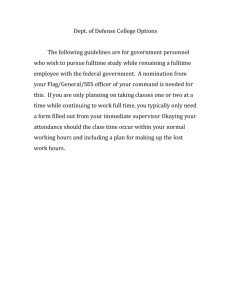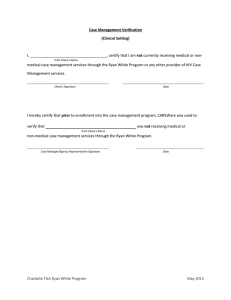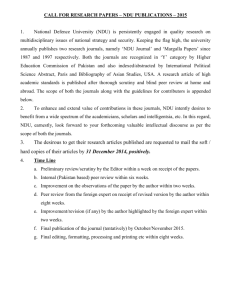CyberLaw A Presentation to the Naval Postgraduate School Monterey, California
advertisement
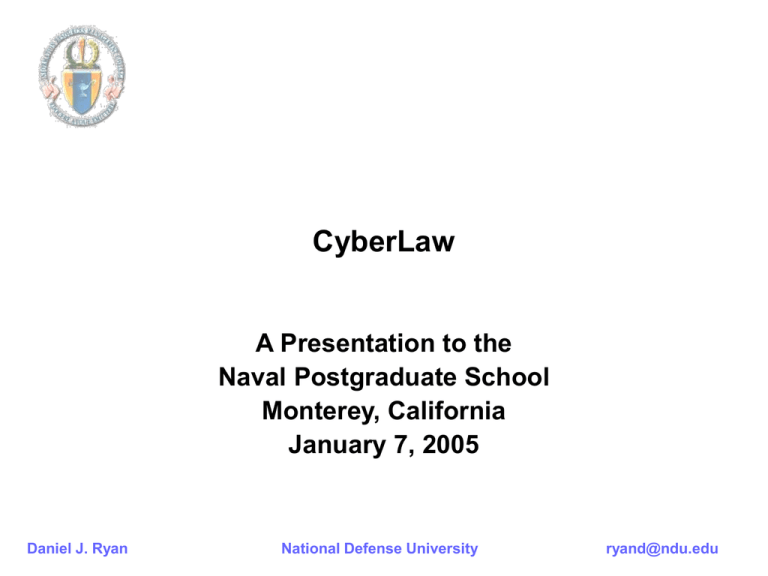
CyberLaw A Presentation to the Naval Postgraduate School Monterey, California January 7, 2005 Daniel J. Ryan National Defense University ryand@ndu.edu Legal Stuff – Read Carefully • This presentation is designed to provide authoritative information with regard to the subject matter covered. The information is provided for your information only and should not be relied upon as legal advice. This presentation makes no warranties, express or implied, based on the information it contains. Nothing in this presentation constitutes the establishment of an attorney-client relationship between you and Daniel J. Ryan, Esquire. Please remember that laws may differ substantially in individual situations or in different states, so you should never rely on legal or other materials from this or any other slide presentation without first seeking advice about your particular situation from an attorney licensed to practice in the appropriate jurisdiction. Nothing contained in this presentation should be construed to constitute a recommendation or endorsement of any company or firm, product, or service. Daniel J. Ryan National Defense University ryand@ndu.edu We face new choices Daniel J. Ryan National Defense University ryand@ndu.edu Networks and CyberCrime • • • • • • • • • Your employees hack your computers They write malicious code and destroy valuable information assets Employees download MP3’s and movies, gobbling up bandwidth and violating copyrights Employees download pornography and share it with other students via your e-mail system Employee downloads child pornography and stores it on the university’s network Employee moonlights by running a personal business form her office workstation Employee steals your intellectual capital and sells it on eBay Employee uses your computers to embezzle from you Disgruntled Employee sabotages your network Daniel J. Ryan National Defense University ryand@ndu.edu Problems => lawsuits – – – – – – – Privacy – especially personal information Property – copyright and patent infringement Torts – defamation, downstream liability Contracts – digital signatures Administrative and Regulatory Law Criminal Law and Procedure Other Fascinating Issues It’s a “target rich” environment! Daniel J. Ryan National Defense University ryand@ndu.edu Federal CyberLaw • • • • • • • • • • • 18 USC 1029 Fraud and Related Activity in Connection with Access Devices 18 USC 1030 Computer Fraud and Abuse Act 18 USC 1362 Communication Lines, Stations or Systems 18 USC 2511 Electronic Communications Privacy Act 18 USC 2701 Unlawful Access to Stored Communications 18 USC 2702 Disclosure of Contents 18 USC 2703 Requirements for Government Access 18 USC 793 Espionage 15 USC 1644 Consumer Credit Protection 17 USC 101 et seq. Copyright 18 USC 1831-2 Economic Espionage Daniel J. Ryan National Defense University ryand@ndu.edu Monitoring Network Operations • Two situations: – Everyday routine operations - vs – Incident response Daniel J. Ryan National Defense University ryand@ndu.edu Auditing and Monitoring Network Activity • Network monitoring – Real-time acquisition and contemporaneous or subsequent analysis of network communications • Ethereal, tcpdump, NIDS such as Snort, email server virus scanners, etc. - vs - • Stored electronic files – Sysop’s and Network Administrator’s review of stored network communications and network or host logs Daniel J. Ryan National Defense University ryand@ndu.edu Criminal Activity on Networks • Illegal Surveillance – Wiretap Act (18 U.S.C. § 2511) – Pen/Trap Statute (18 U.S.C. § 3121) – Electronic Communications Privacy Act (18 U.S.C. § 2701) • Network Crimes – Computer Fraud and Abuse Act (18 U.S.C. § 1030) • Using a Network to Commit Traditional Crimes – – – – Daniel J. Ryan Criminal copyright/trade secret violations Threats, stalking and harassment Child pornography Fraud, embezzlement, money laundering, counterfeiting, extortion National Defense University ryand@ndu.edu Illegal Surveillance • Wiretap Act (Title III - ECPA I) – real-time interception of electronic, voice and wire communication content contemporaneous with transmission • Examples: packet data payloads, email subject lines • Pen Register/Trap and Trace Statute (Pen/Trap) – installation or use of a device that decodes or intercepts electronic and wire communication non-content such as routing or addressing information • Examples: packet headers, email bang lines • The Stored Communications Act (ECPA II) – Covers illegal access to certain stored voice and electronic communication service facilities Daniel J. Ryan National Defense University ryand@ndu.edu Wiretap Act • Prohibits intercepting the content of communications during delivery unless an exception applies • Four important exceptions: – – – – Daniel J. Ryan Consent [18 U.S.C. § 2511(2)(c)] Provider exception [18 U.S.C. § 2511(2)(a)(i)] Computer Trespasser [18 U.S.C. § 2511(2)(i)] Publicly Accessible [18 U.S.C. § 2511(2)(g)(i)] National Defense University ryand@ndu.edu Consent Exception • Two types of consent: – Party consent – Implied or express consent by a non-party Daniel J. Ryan National Defense University ryand@ndu.edu Party Consent • Lawful to intercept if you are a party to the communication – Who is a “party” to computer network communications? • Some cases suggest that the owner of a computer network (and the owner’s agents) are a “party” to communications sent to and from the network. But: What about the pass-through victim? Daniel J. Ryan National Defense University ryand@ndu.edu Implied and Express Consent • Obtain express or implied consent to monitor prior to interception – Implied: Banner on the login screen – Express: Obtain written consent of authorized users But: Trespassers unlikely to see banners and won’t give express consent Daniel J. Ryan National Defense University ryand@ndu.edu Provider Exception • Allows network owners (and their agents) to conduct reasonable interception, use & disclose: – To protect provider’s “rights or property” – When done in normal course of business while engaged in any activity which is a necessary incident to the rendition of service But: Does not permit unlimited monitoring But: You cannot use provider exception to prospectively gather evidence for law enforcement Daniel J. Ryan National Defense University ryand@ndu.edu Computer Trespasser Exception • USA PATRIOT Act modification to Wiretap Act • Allows law enforcement to intercept communications to or from “computer trespassers” – A “computer trespasser” is a person who accesses a computer without authorization • excludes persons known by the provider to have an existing contractual relationship with the provider for use of the system • someone exceeding their authorized use is not a trespasser – Applies only if the provider authorizes the interception – Interception performed by law enforcement or its agent But: Expires Dec. 31, 2005 (unless Patriot Act extended) Daniel J. Ryan National Defense University ryand@ndu.edu Publicly Accessible Exception • Permits interception of communications that are readily accessible to the general public – Example: public message board postings But: Does not apply to private forums – private chat session within public chat room – if bannered, consent may apply Daniel J. Ryan National Defense University ryand@ndu.edu PEN/TRAP Statute • Prohibits intercepting the non-content parts of communications streaming across a network unless an exception applies • Broad authority for providers to use pen/trap devices: – – – – For operations, maintenance, or testing; To protect rights or property; To protect users from abuse or unlawful use; To record communication initiation and completion to protect rights or property, another provider furnishing service and users from fraudulent, unlawful or abusive use of service; and – Where the implied or express consent of the user has been obtained. Daniel J. Ryan National Defense University ryand@ndu.edu Stored Communications • 18 USC § 2701 prohibits accessing electronic or wire communications in “electronic storage” without or in excess of authorization – Example: obtaining, altering or deleting unretrieved email • Provider exception: – § 2701 does not apply to conduct authorized by the person or entity providing an electronic or wire service – Example: e-mail virus scanning Daniel J. Ryan National Defense University ryand@ndu.edu Circuit Switching Daniel J. Ryan National Defense University ryand@ndu.edu Circuit Switching Daniel J. Ryan National Defense University ryand@ndu.edu Circuit Switching Daniel J. Ryan National Defense University ryand@ndu.edu Packet Switching Daniel J. Ryan National Defense University ryand@ndu.edu Packet Switching Daniel J. Ryan National Defense University ryand@ndu.edu Packet Switching Daniel J. Ryan National Defense University ryand@ndu.edu Packet Switching Daniel J. Ryan National Defense University ryand@ndu.edu Key Cases • • • • • • • Steve Jackson Games v. USSS Konop v. Hawaiian Airlines US v. Scarfo US v. Steiger Thompson v. Thompson US v. Councilman Theofel v. Farley-Jones Daniel J. Ryan National Defense University ryand@ndu.edu Incident Response • Criminal activity on the network – Network Crime – Other types of crime • Call in law enforcement • Keep records that will quantify the damages caused by the incident • Log traffic data • Consider imaging affected systems Remember: Digital forensics is not for amateurs Daniel J. Ryan National Defense University ryand@ndu.edu Preparing in Advance • Instill healthy concern and caution – Management • Instill concern and illustrate threat • Emphasize planning, policies and procedure – CERT Team • Trained and equipped – Sys admins and network engineers • Instill caution – All employees • What to look for • Who to call Daniel J. Ryan National Defense University ryand@ndu.edu Civil CyberLaw – Privacy • E-mail privacy • Adult materials • Spam – Torts • Defamation • Tortious interference with business • Downstream liability – Intellectual Property • Copyrights, patents, trade secrets, trade dress Daniel J. Ryan – Contract Law • Electronic signatures • e-commerce and e-government – Jurisdiction in cyberspace – Administrative Law and Regulation – Business and tax law – Professional liability • Erroneous information • Professionals • Professors National Defense University ryand@ndu.edu Thank You! Daniel J. Ryan Professor Information Resources Management College National Defense University 202.685.2843 v ryand@ndu.edu www.danjryan.com Daniel J. Ryan National Defense University ryand@ndu.edu
